Public Administration: A Century of Paradigms and Development
VerifiedAdded on 2022/08/29
|16
|3087
|25
Report
AI Summary
This report provides an overview of the evolution of Public Administration, drawing on Dr. Nicholas Henry's framework of five paradigms spanning a century. The report begins with an executive summary highlighting the influence of Public Administration on democracy through paradigms, and then delves into each paradigm, analyzing the profession's state, its relationship with American society, and its impact on democratic values. Paradigm 1 covers the Politics/Administration Dichotomy (1900-1926), while subsequent paradigms explore the Principles of Administration (1927-1937), Public Administration as Political Science (1950-1970), Public Administration as Management (1950-1970), and Public Administration as Public Administration (1950-1970). Each paradigm is examined in terms of its professional, academic, societal, and value-based aspects. The report highlights the challenges and criticisms faced by Public Administration, particularly in the academic field of the United States, and concludes by emphasizing the influence of Public Administration on democracy and its institutions. The report includes an introduction, table of contents, and references.
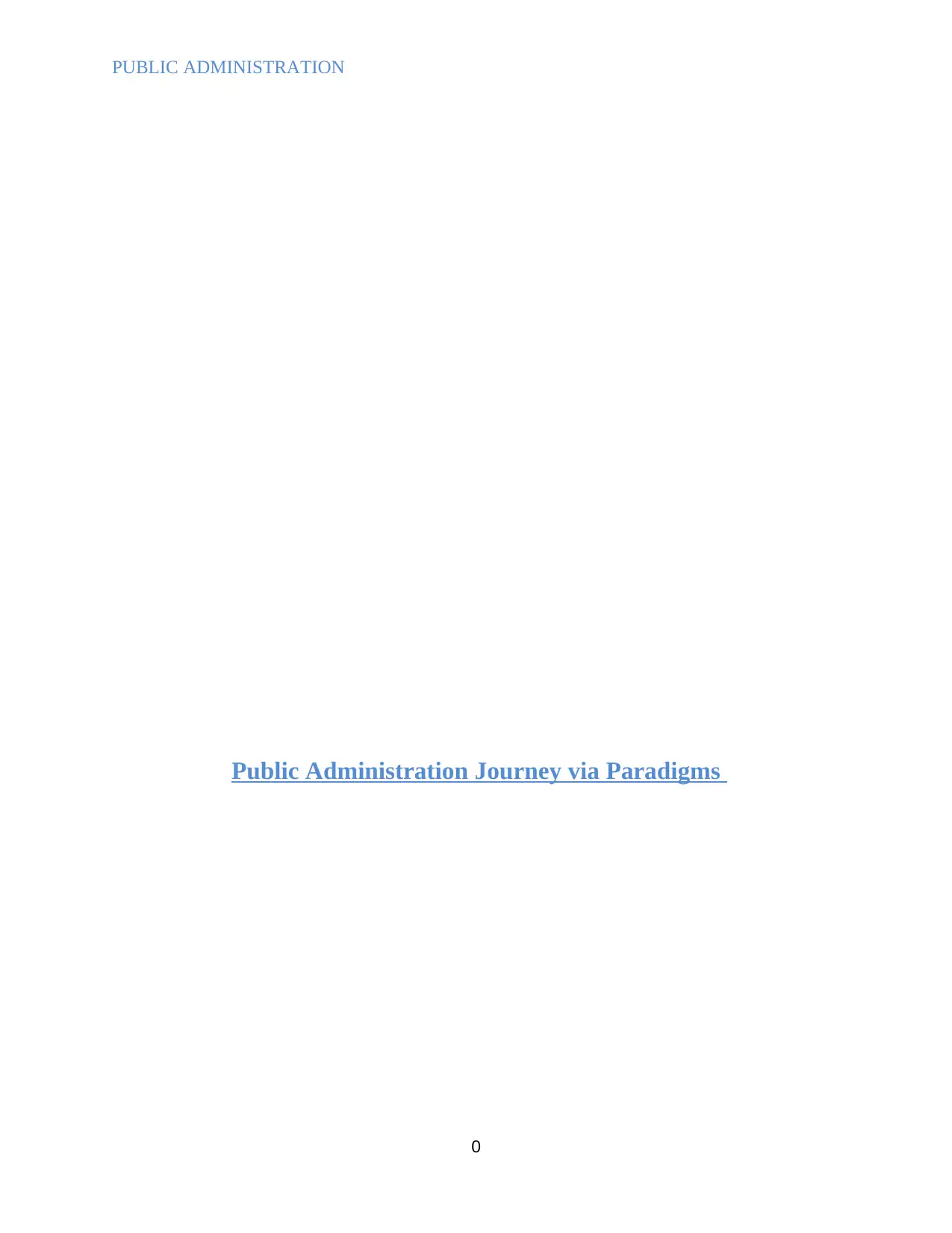
PUBLIC ADMINISTRATION
Public Administration Journey via Paradigms
0
Public Administration Journey via Paradigms
0
Paraphrase This Document
Need a fresh take? Get an instant paraphrase of this document with our AI Paraphraser
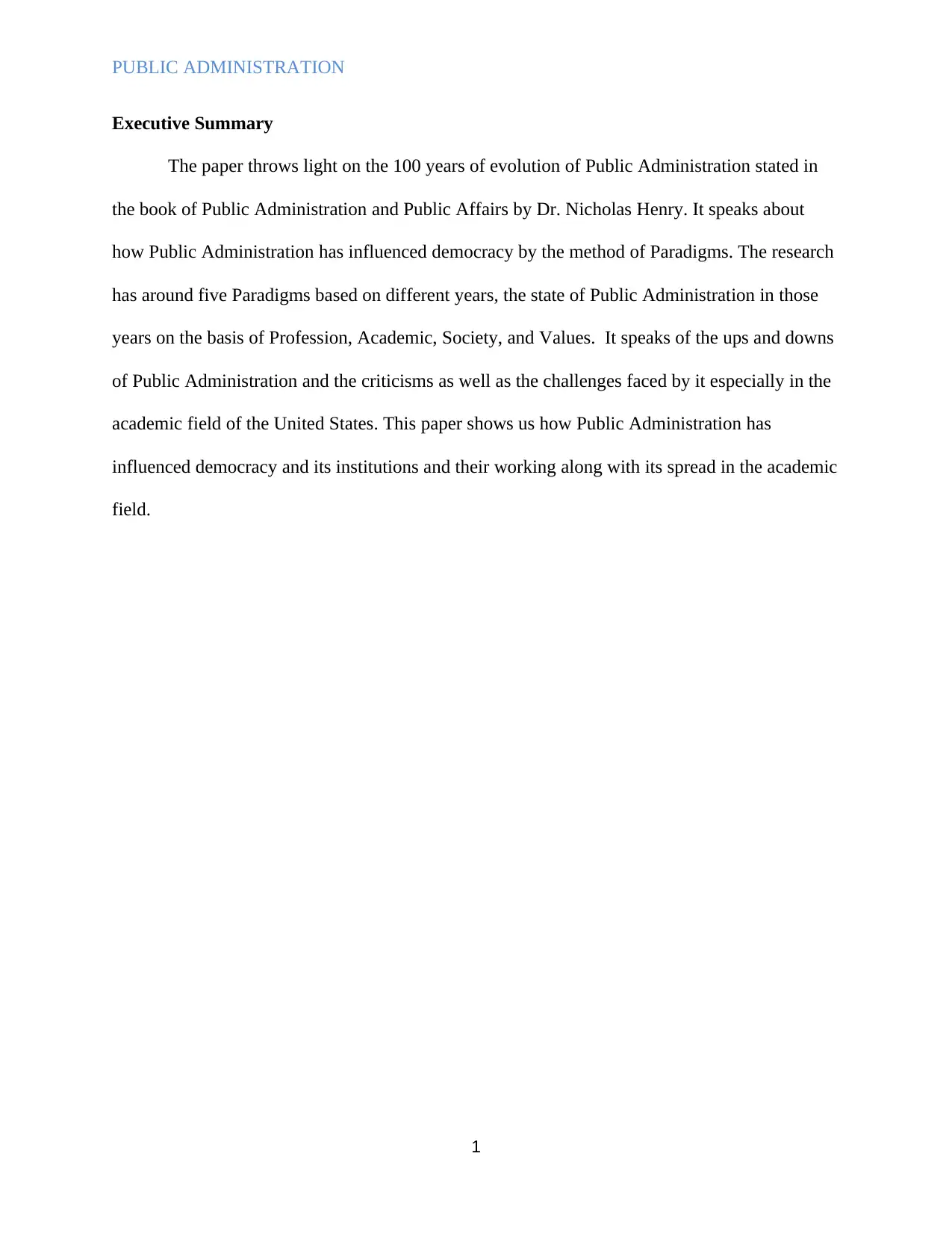
PUBLIC ADMINISTRATION
Executive Summary
The paper throws light on the 100 years of evolution of Public Administration stated in
the book of Public Administration and Public Affairs by Dr. Nicholas Henry. It speaks about
how Public Administration has influenced democracy by the method of Paradigms. The research
has around five Paradigms based on different years, the state of Public Administration in those
years on the basis of Profession, Academic, Society, and Values. It speaks of the ups and downs
of Public Administration and the criticisms as well as the challenges faced by it especially in the
academic field of the United States. This paper shows us how Public Administration has
influenced democracy and its institutions and their working along with its spread in the academic
field.
1
Executive Summary
The paper throws light on the 100 years of evolution of Public Administration stated in
the book of Public Administration and Public Affairs by Dr. Nicholas Henry. It speaks about
how Public Administration has influenced democracy by the method of Paradigms. The research
has around five Paradigms based on different years, the state of Public Administration in those
years on the basis of Profession, Academic, Society, and Values. It speaks of the ups and downs
of Public Administration and the criticisms as well as the challenges faced by it especially in the
academic field of the United States. This paper shows us how Public Administration has
influenced democracy and its institutions and their working along with its spread in the academic
field.
1
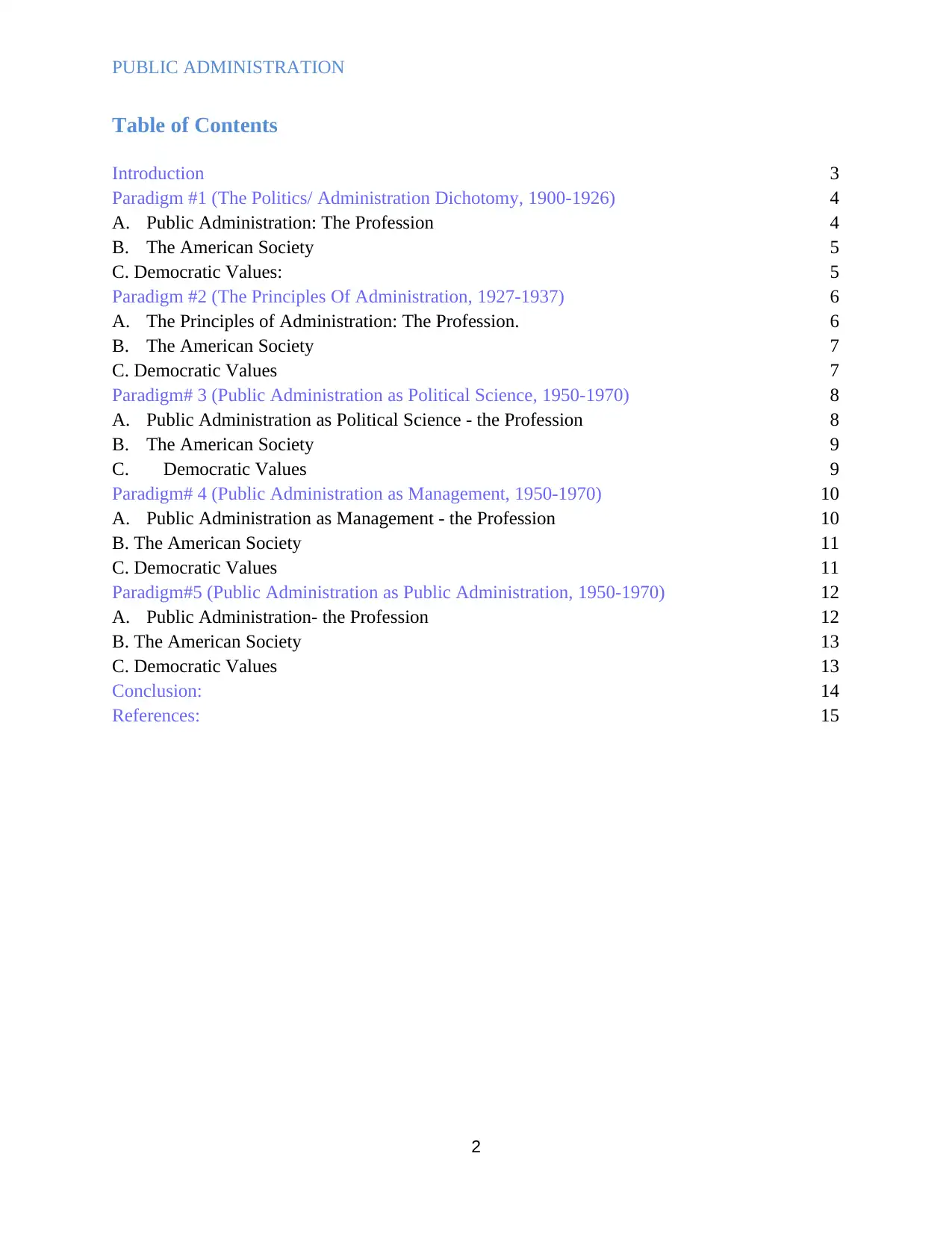
PUBLIC ADMINISTRATION
Table of Contents
Introduction 3
Paradigm #1 (The Politics/ Administration Dichotomy, 1900-1926) 4
A. Public Administration: The Profession 4
B. The American Society 5
C. Democratic Values: 5
Paradigm #2 (The Principles Of Administration, 1927-1937) 6
A. The Principles of Administration: The Profession. 6
B. The American Society 7
C. Democratic Values 7
Paradigm# 3 (Public Administration as Political Science, 1950-1970) 8
A. Public Administration as Political Science - the Profession 8
B. The American Society 9
C. Democratic Values 9
Paradigm# 4 (Public Administration as Management, 1950-1970) 10
A. Public Administration as Management - the Profession 10
B. The American Society 11
C. Democratic Values 11
Paradigm#5 (Public Administration as Public Administration, 1950-1970) 12
A. Public Administration- the Profession 12
B. The American Society 13
C. Democratic Values 13
Conclusion: 14
References: 15
2
Table of Contents
Introduction 3
Paradigm #1 (The Politics/ Administration Dichotomy, 1900-1926) 4
A. Public Administration: The Profession 4
B. The American Society 5
C. Democratic Values: 5
Paradigm #2 (The Principles Of Administration, 1927-1937) 6
A. The Principles of Administration: The Profession. 6
B. The American Society 7
C. Democratic Values 7
Paradigm# 3 (Public Administration as Political Science, 1950-1970) 8
A. Public Administration as Political Science - the Profession 8
B. The American Society 9
C. Democratic Values 9
Paradigm# 4 (Public Administration as Management, 1950-1970) 10
A. Public Administration as Management - the Profession 10
B. The American Society 11
C. Democratic Values 11
Paradigm#5 (Public Administration as Public Administration, 1950-1970) 12
A. Public Administration- the Profession 12
B. The American Society 13
C. Democratic Values 13
Conclusion: 14
References: 15
2
⊘ This is a preview!⊘
Do you want full access?
Subscribe today to unlock all pages.

Trusted by 1+ million students worldwide
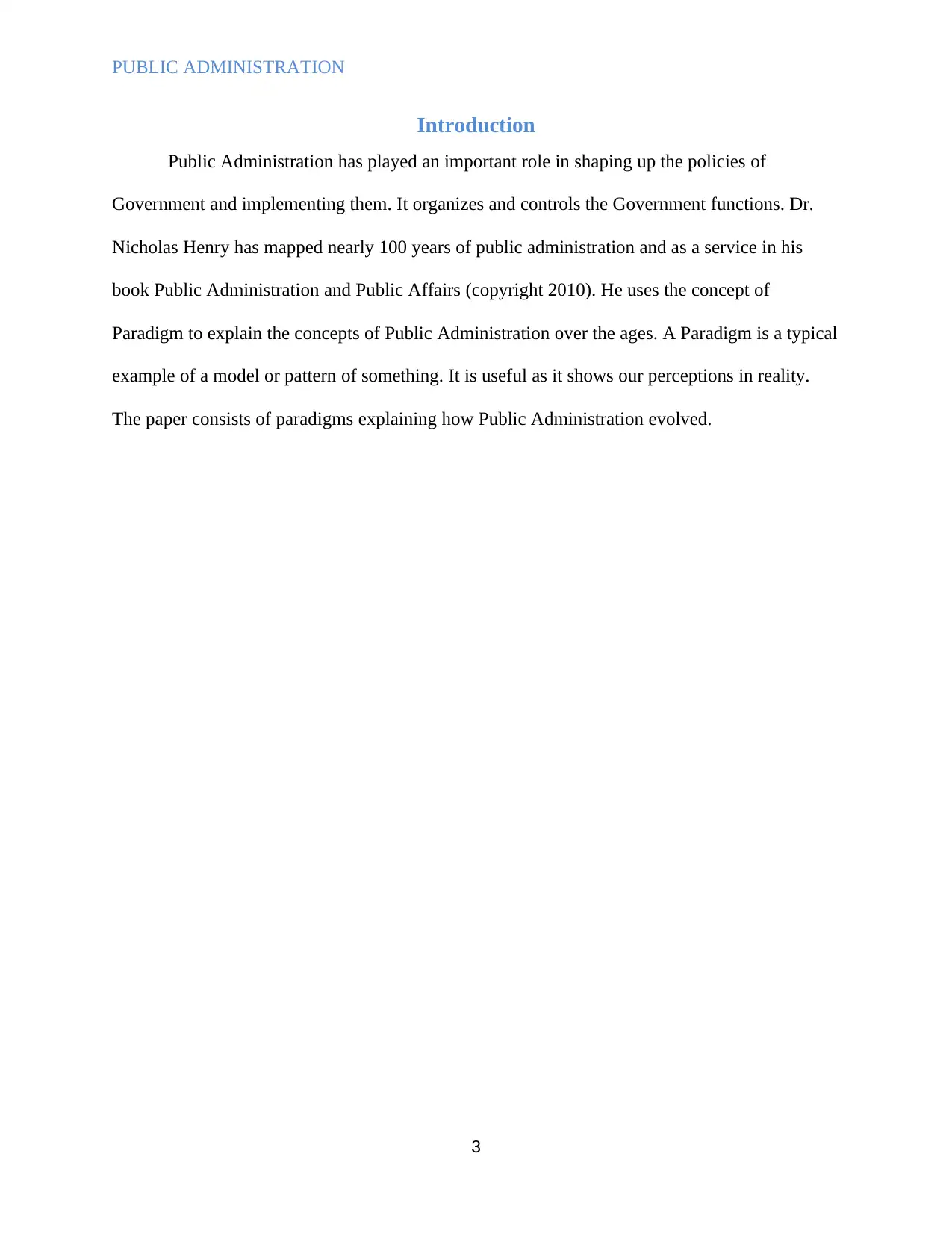
PUBLIC ADMINISTRATION
Introduction
Public Administration has played an important role in shaping up the policies of
Government and implementing them. It organizes and controls the Government functions. Dr.
Nicholas Henry has mapped nearly 100 years of public administration and as a service in his
book Public Administration and Public Affairs (copyright 2010). He uses the concept of
Paradigm to explain the concepts of Public Administration over the ages. A Paradigm is a typical
example of a model or pattern of something. It is useful as it shows our perceptions in reality.
The paper consists of paradigms explaining how Public Administration evolved.
3
Introduction
Public Administration has played an important role in shaping up the policies of
Government and implementing them. It organizes and controls the Government functions. Dr.
Nicholas Henry has mapped nearly 100 years of public administration and as a service in his
book Public Administration and Public Affairs (copyright 2010). He uses the concept of
Paradigm to explain the concepts of Public Administration over the ages. A Paradigm is a typical
example of a model or pattern of something. It is useful as it shows our perceptions in reality.
The paper consists of paradigms explaining how Public Administration evolved.
3
Paraphrase This Document
Need a fresh take? Get an instant paraphrase of this document with our AI Paraphraser
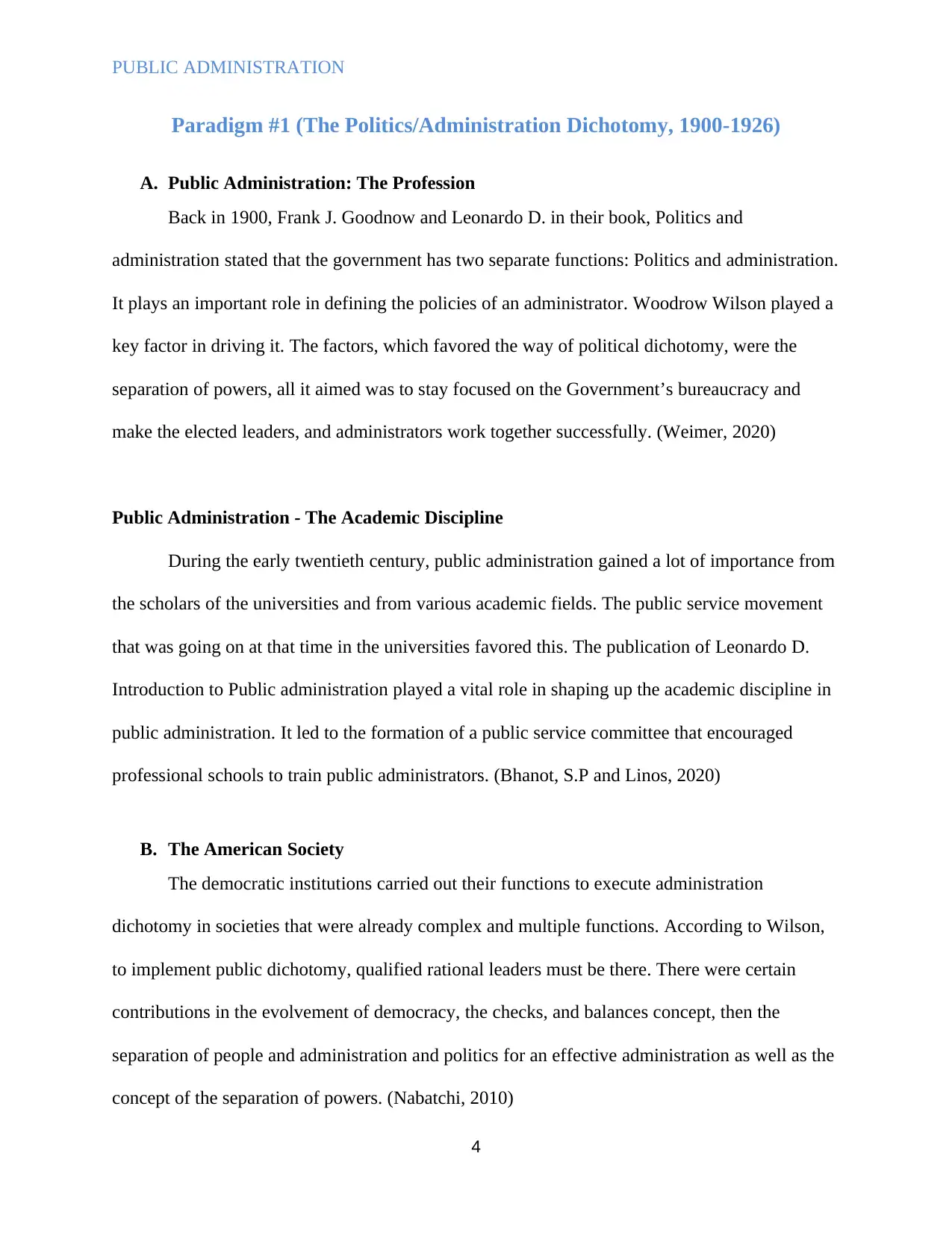
PUBLIC ADMINISTRATION
Paradigm #1 (The Politics/Administration Dichotomy, 1900-1926)
A. Public Administration: The Profession
Back in 1900, Frank J. Goodnow and Leonardo D. in their book, Politics and
administration stated that the government has two separate functions: Politics and administration.
It plays an important role in defining the policies of an administrator. Woodrow Wilson played a
key factor in driving it. The factors, which favored the way of political dichotomy, were the
separation of powers, all it aimed was to stay focused on the Government’s bureaucracy and
make the elected leaders, and administrators work together successfully. (Weimer, 2020)
Public Administration - The Academic Discipline
During the early twentieth century, public administration gained a lot of importance from
the scholars of the universities and from various academic fields. The public service movement
that was going on at that time in the universities favored this. The publication of Leonardo D.
Introduction to Public administration played a vital role in shaping up the academic discipline in
public administration. It led to the formation of a public service committee that encouraged
professional schools to train public administrators. (Bhanot, S.P and Linos, 2020)
B. The American Society
The democratic institutions carried out their functions to execute administration
dichotomy in societies that were already complex and multiple functions. According to Wilson,
to implement public dichotomy, qualified rational leaders must be there. There were certain
contributions in the evolvement of democracy, the checks, and balances concept, then the
separation of people and administration and politics for an effective administration as well as the
concept of the separation of powers. (Nabatchi, 2010)
4
Paradigm #1 (The Politics/Administration Dichotomy, 1900-1926)
A. Public Administration: The Profession
Back in 1900, Frank J. Goodnow and Leonardo D. in their book, Politics and
administration stated that the government has two separate functions: Politics and administration.
It plays an important role in defining the policies of an administrator. Woodrow Wilson played a
key factor in driving it. The factors, which favored the way of political dichotomy, were the
separation of powers, all it aimed was to stay focused on the Government’s bureaucracy and
make the elected leaders, and administrators work together successfully. (Weimer, 2020)
Public Administration - The Academic Discipline
During the early twentieth century, public administration gained a lot of importance from
the scholars of the universities and from various academic fields. The public service movement
that was going on at that time in the universities favored this. The publication of Leonardo D.
Introduction to Public administration played a vital role in shaping up the academic discipline in
public administration. It led to the formation of a public service committee that encouraged
professional schools to train public administrators. (Bhanot, S.P and Linos, 2020)
B. The American Society
The democratic institutions carried out their functions to execute administration
dichotomy in societies that were already complex and multiple functions. According to Wilson,
to implement public dichotomy, qualified rational leaders must be there. There were certain
contributions in the evolvement of democracy, the checks, and balances concept, then the
separation of people and administration and politics for an effective administration as well as the
concept of the separation of powers. (Nabatchi, 2010)
4
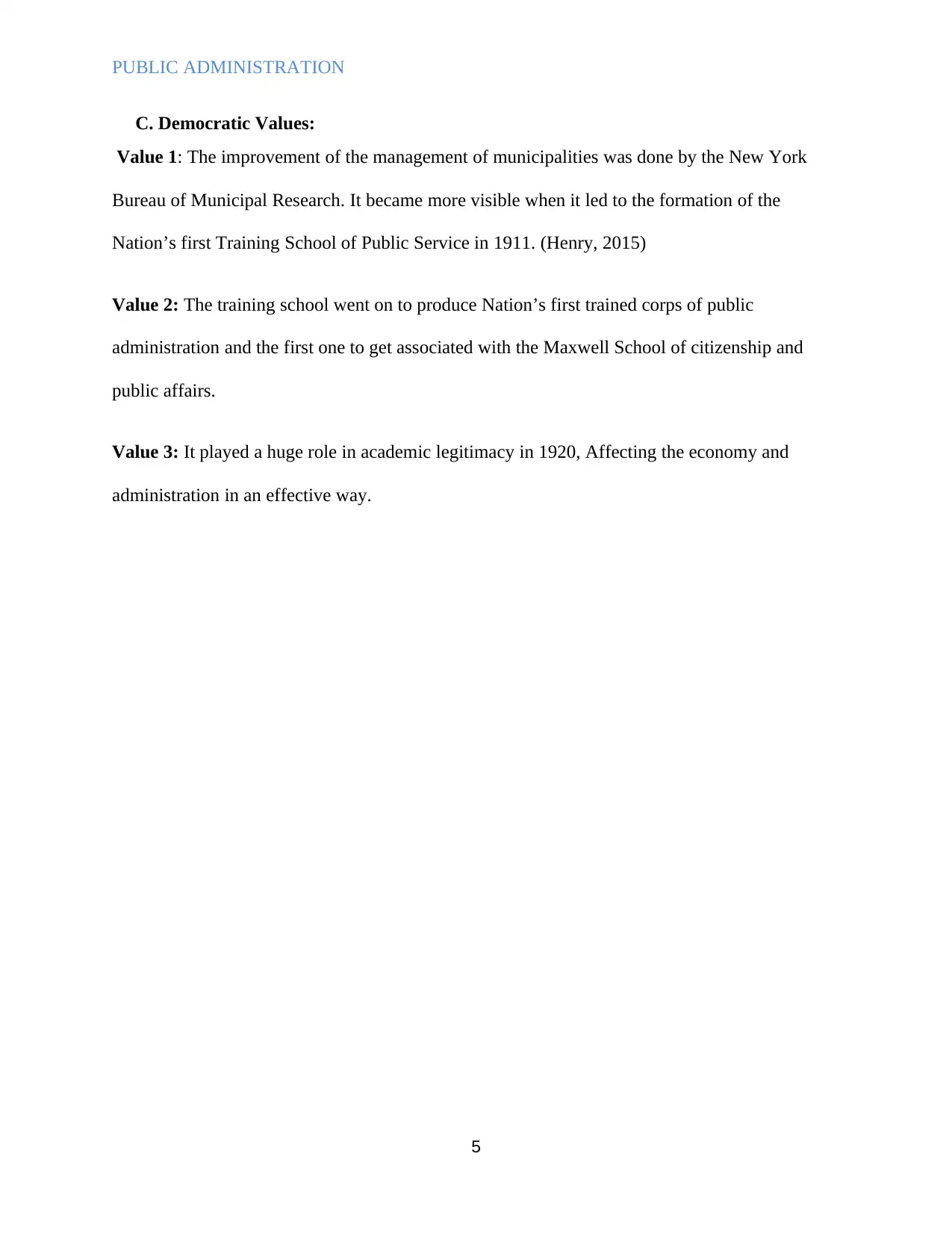
PUBLIC ADMINISTRATION
C. Democratic Values:
Value 1: The improvement of the management of municipalities was done by the New York
Bureau of Municipal Research. It became more visible when it led to the formation of the
Nation’s first Training School of Public Service in 1911. (Henry, 2015)
Value 2: The training school went on to produce Nation’s first trained corps of public
administration and the first one to get associated with the Maxwell School of citizenship and
public affairs.
Value 3: It played a huge role in academic legitimacy in 1920, Affecting the economy and
administration in an effective way.
5
C. Democratic Values:
Value 1: The improvement of the management of municipalities was done by the New York
Bureau of Municipal Research. It became more visible when it led to the formation of the
Nation’s first Training School of Public Service in 1911. (Henry, 2015)
Value 2: The training school went on to produce Nation’s first trained corps of public
administration and the first one to get associated with the Maxwell School of citizenship and
public affairs.
Value 3: It played a huge role in academic legitimacy in 1920, Affecting the economy and
administration in an effective way.
5
⊘ This is a preview!⊘
Do you want full access?
Subscribe today to unlock all pages.

Trusted by 1+ million students worldwide
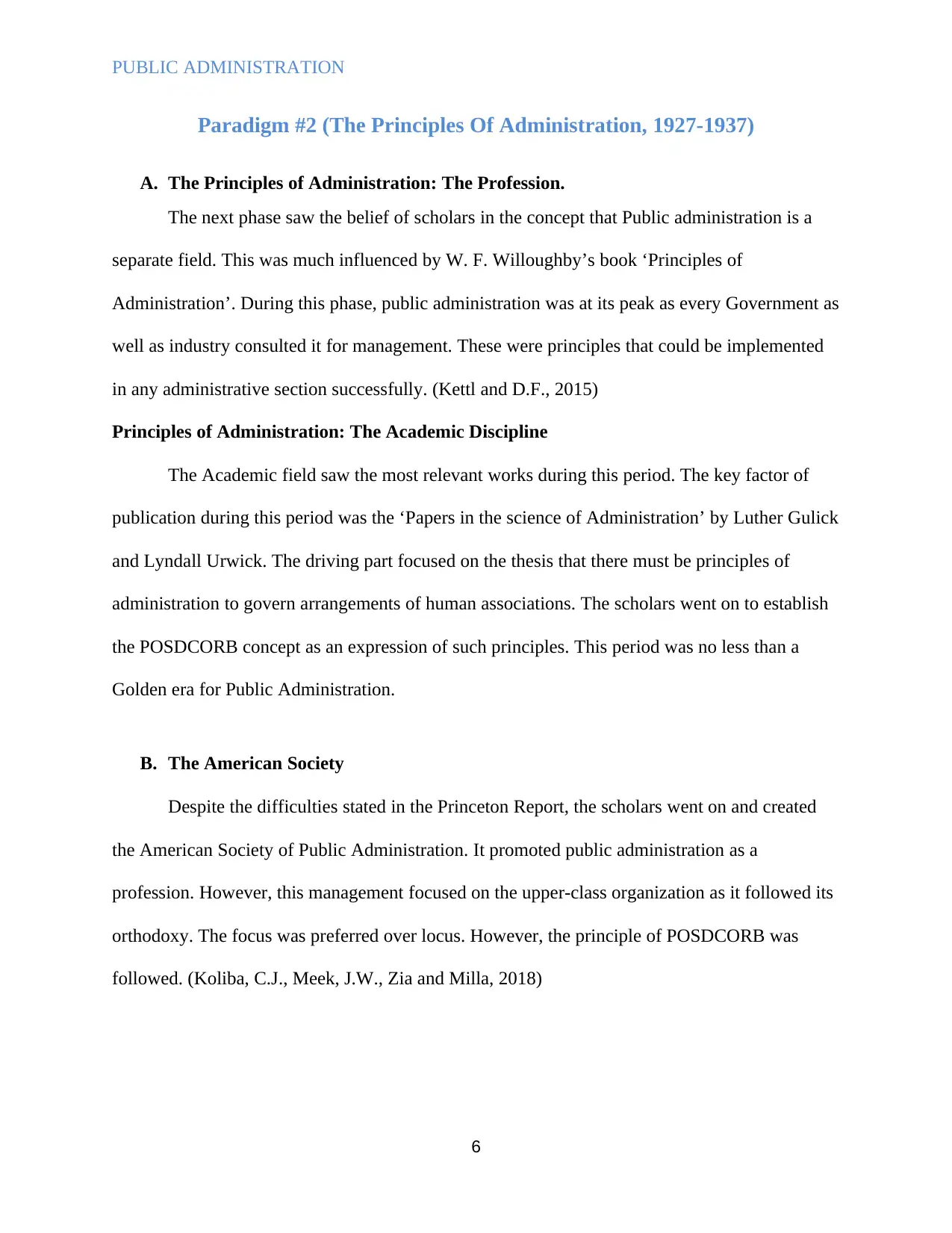
PUBLIC ADMINISTRATION
Paradigm #2 (The Principles Of Administration, 1927-1937)
A. The Principles of Administration: The Profession.
The next phase saw the belief of scholars in the concept that Public administration is a
separate field. This was much influenced by W. F. Willoughby’s book ‘Principles of
Administration’. During this phase, public administration was at its peak as every Government as
well as industry consulted it for management. These were principles that could be implemented
in any administrative section successfully. (Kettl and D.F., 2015)
Principles of Administration: The Academic Discipline
The Academic field saw the most relevant works during this period. The key factor of
publication during this period was the ‘Papers in the science of Administration’ by Luther Gulick
and Lyndall Urwick. The driving part focused on the thesis that there must be principles of
administration to govern arrangements of human associations. The scholars went on to establish
the POSDCORB concept as an expression of such principles. This period was no less than a
Golden era for Public Administration.
B. The American Society
Despite the difficulties stated in the Princeton Report, the scholars went on and created
the American Society of Public Administration. It promoted public administration as a
profession. However, this management focused on the upper-class organization as it followed its
orthodoxy. The focus was preferred over locus. However, the principle of POSDCORB was
followed. (Koliba, C.J., Meek, J.W., Zia and Milla, 2018)
6
Paradigm #2 (The Principles Of Administration, 1927-1937)
A. The Principles of Administration: The Profession.
The next phase saw the belief of scholars in the concept that Public administration is a
separate field. This was much influenced by W. F. Willoughby’s book ‘Principles of
Administration’. During this phase, public administration was at its peak as every Government as
well as industry consulted it for management. These were principles that could be implemented
in any administrative section successfully. (Kettl and D.F., 2015)
Principles of Administration: The Academic Discipline
The Academic field saw the most relevant works during this period. The key factor of
publication during this period was the ‘Papers in the science of Administration’ by Luther Gulick
and Lyndall Urwick. The driving part focused on the thesis that there must be principles of
administration to govern arrangements of human associations. The scholars went on to establish
the POSDCORB concept as an expression of such principles. This period was no less than a
Golden era for Public Administration.
B. The American Society
Despite the difficulties stated in the Princeton Report, the scholars went on and created
the American Society of Public Administration. It promoted public administration as a
profession. However, this management focused on the upper-class organization as it followed its
orthodoxy. The focus was preferred over locus. However, the principle of POSDCORB was
followed. (Koliba, C.J., Meek, J.W., Zia and Milla, 2018)
6
Paraphrase This Document
Need a fresh take? Get an instant paraphrase of this document with our AI Paraphraser
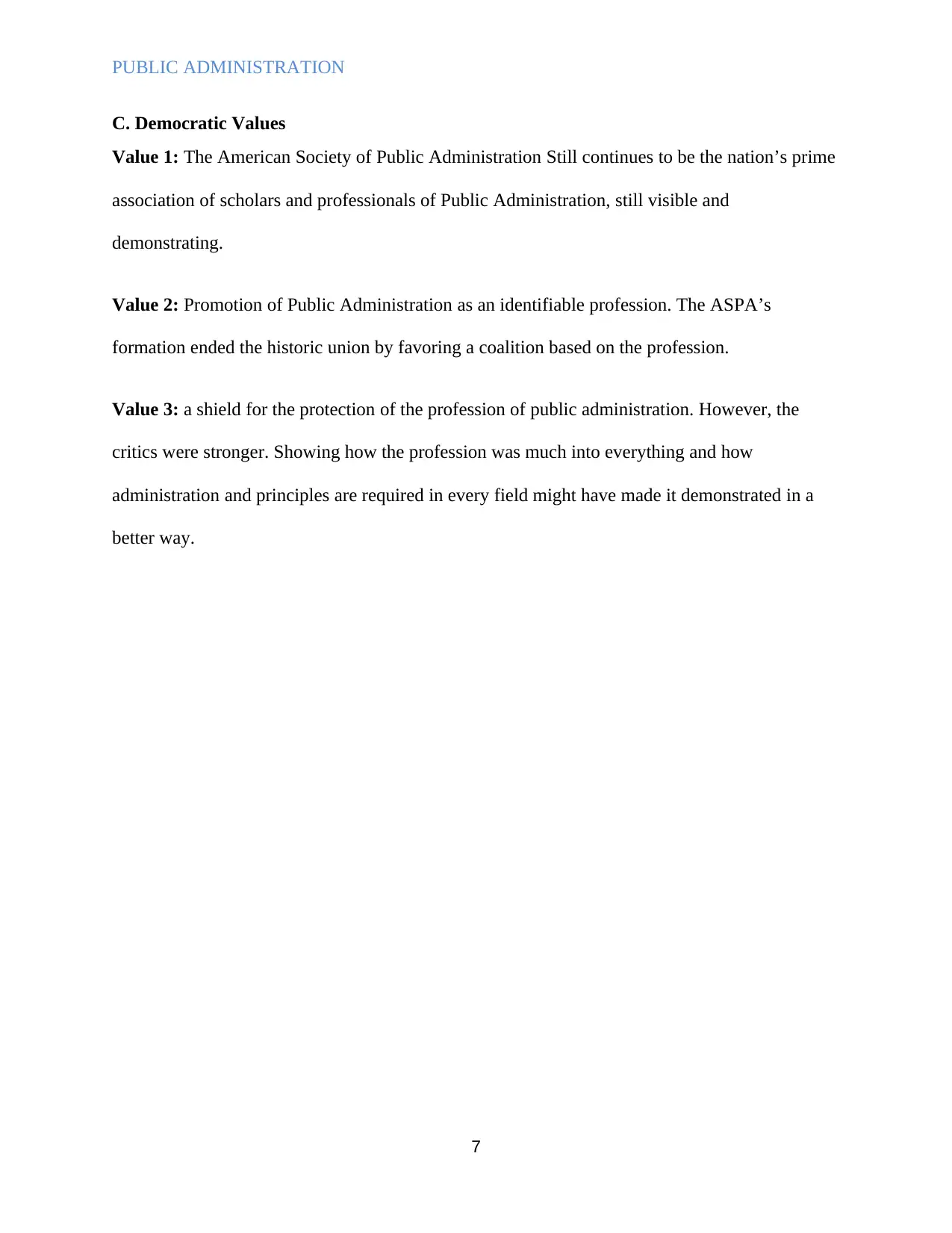
PUBLIC ADMINISTRATION
C. Democratic Values
Value 1: The American Society of Public Administration Still continues to be the nation’s prime
association of scholars and professionals of Public Administration, still visible and
demonstrating.
Value 2: Promotion of Public Administration as an identifiable profession. The ASPA’s
formation ended the historic union by favoring a coalition based on the profession.
Value 3: a shield for the protection of the profession of public administration. However, the
critics were stronger. Showing how the profession was much into everything and how
administration and principles are required in every field might have made it demonstrated in a
better way.
7
C. Democratic Values
Value 1: The American Society of Public Administration Still continues to be the nation’s prime
association of scholars and professionals of Public Administration, still visible and
demonstrating.
Value 2: Promotion of Public Administration as an identifiable profession. The ASPA’s
formation ended the historic union by favoring a coalition based on the profession.
Value 3: a shield for the protection of the profession of public administration. However, the
critics were stronger. Showing how the profession was much into everything and how
administration and principles are required in every field might have made it demonstrated in a
better way.
7
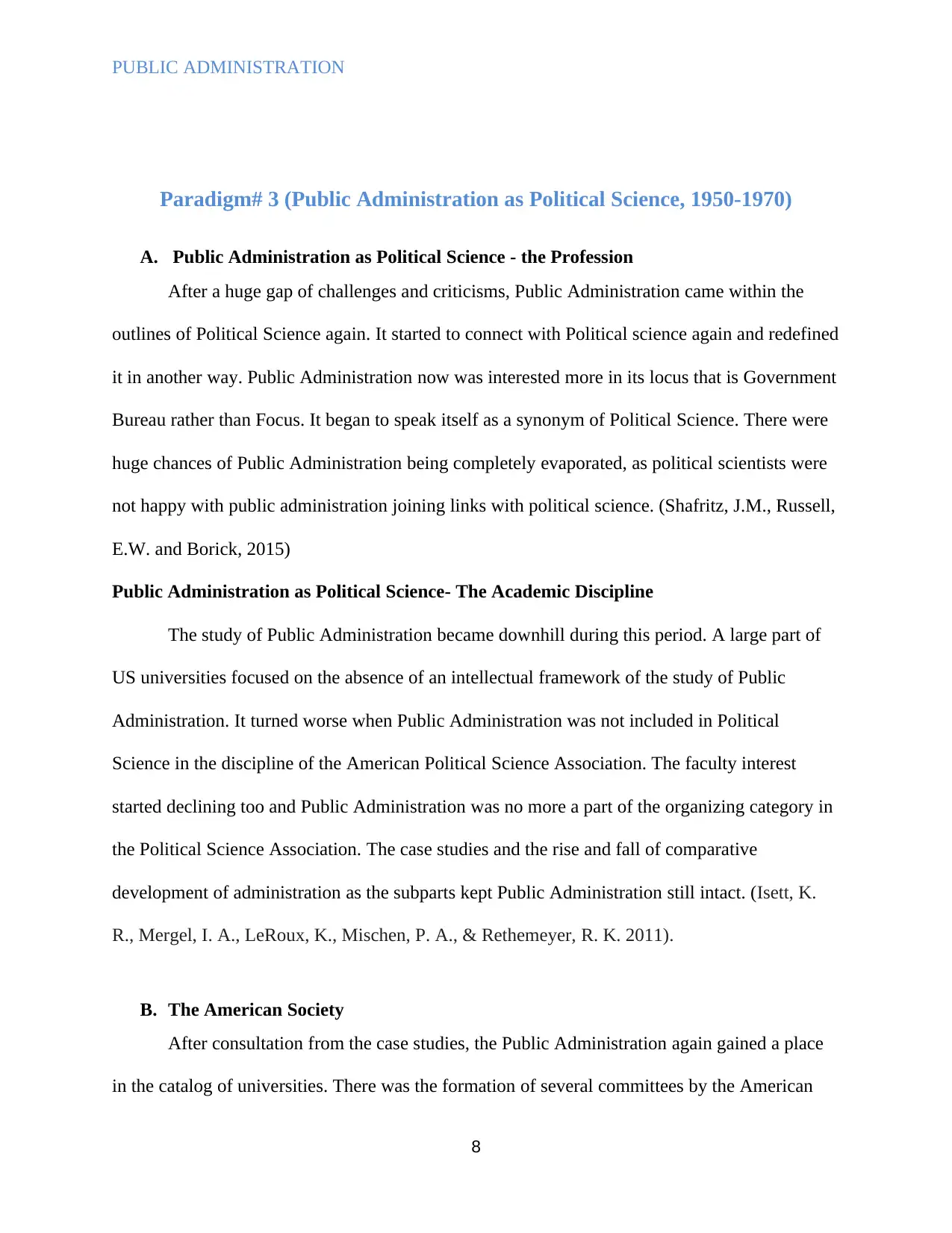
PUBLIC ADMINISTRATION
Paradigm# 3 (Public Administration as Political Science, 1950-1970)
A. Public Administration as Political Science - the Profession
After a huge gap of challenges and criticisms, Public Administration came within the
outlines of Political Science again. It started to connect with Political science again and redefined
it in another way. Public Administration now was interested more in its locus that is Government
Bureau rather than Focus. It began to speak itself as a synonym of Political Science. There were
huge chances of Public Administration being completely evaporated, as political scientists were
not happy with public administration joining links with political science. (Shafritz, J.M., Russell,
E.W. and Borick, 2015)
Public Administration as Political Science- The Academic Discipline
The study of Public Administration became downhill during this period. A large part of
US universities focused on the absence of an intellectual framework of the study of Public
Administration. It turned worse when Public Administration was not included in Political
Science in the discipline of the American Political Science Association. The faculty interest
started declining too and Public Administration was no more a part of the organizing category in
the Political Science Association. The case studies and the rise and fall of comparative
development of administration as the subparts kept Public Administration still intact. (Isett, K.
R., Mergel, I. A., LeRoux, K., Mischen, P. A., & Rethemeyer, R. K. 2011).
B. The American Society
After consultation from the case studies, the Public Administration again gained a place
in the catalog of universities. There was the formation of several committees by the American
8
Paradigm# 3 (Public Administration as Political Science, 1950-1970)
A. Public Administration as Political Science - the Profession
After a huge gap of challenges and criticisms, Public Administration came within the
outlines of Political Science again. It started to connect with Political science again and redefined
it in another way. Public Administration now was interested more in its locus that is Government
Bureau rather than Focus. It began to speak itself as a synonym of Political Science. There were
huge chances of Public Administration being completely evaporated, as political scientists were
not happy with public administration joining links with political science. (Shafritz, J.M., Russell,
E.W. and Borick, 2015)
Public Administration as Political Science- The Academic Discipline
The study of Public Administration became downhill during this period. A large part of
US universities focused on the absence of an intellectual framework of the study of Public
Administration. It turned worse when Public Administration was not included in Political
Science in the discipline of the American Political Science Association. The faculty interest
started declining too and Public Administration was no more a part of the organizing category in
the Political Science Association. The case studies and the rise and fall of comparative
development of administration as the subparts kept Public Administration still intact. (Isett, K.
R., Mergel, I. A., LeRoux, K., Mischen, P. A., & Rethemeyer, R. K. 2011).
B. The American Society
After consultation from the case studies, the Public Administration again gained a place
in the catalog of universities. There was the formation of several committees by the American
8
⊘ This is a preview!⊘
Do you want full access?
Subscribe today to unlock all pages.

Trusted by 1+ million students worldwide
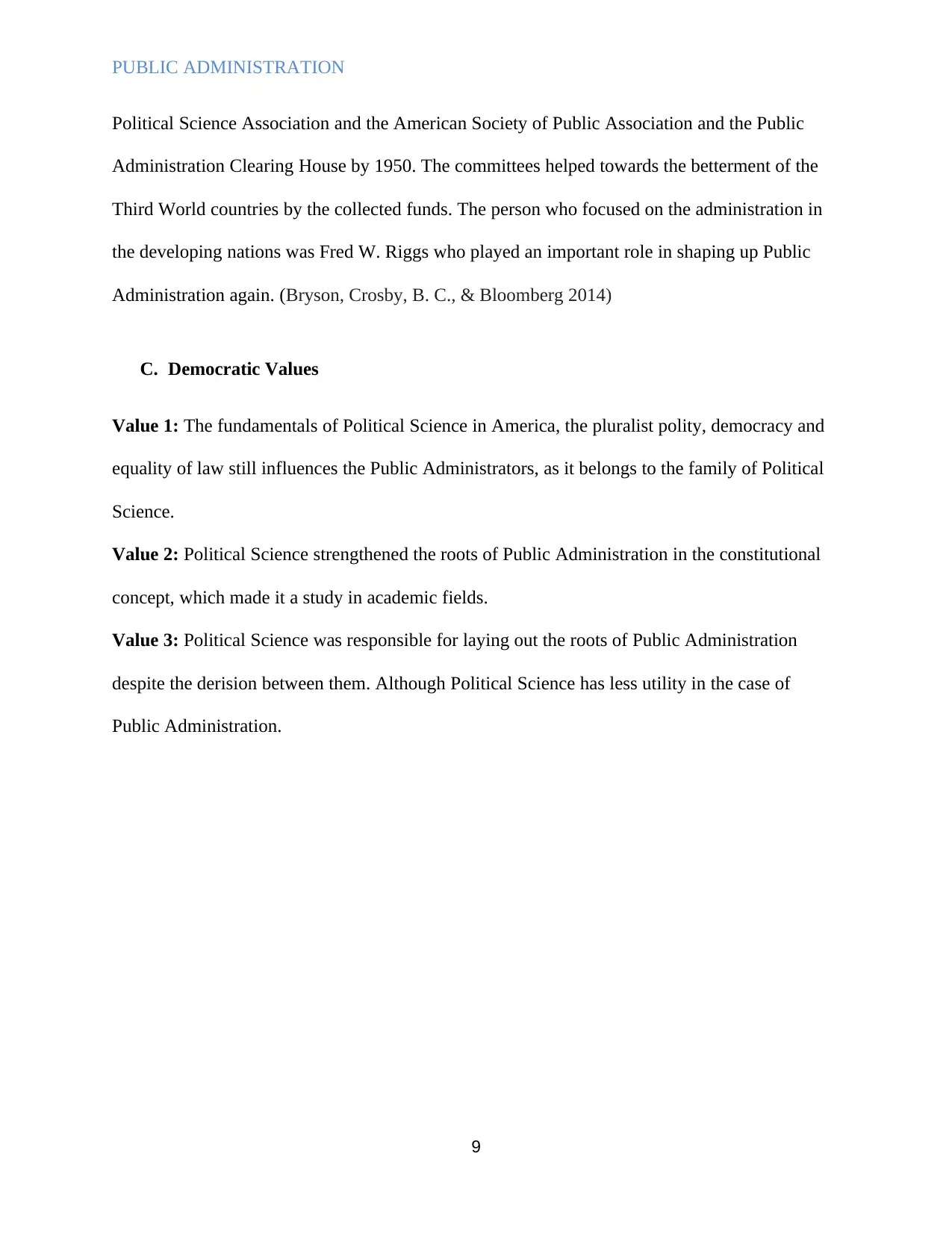
PUBLIC ADMINISTRATION
Political Science Association and the American Society of Public Association and the Public
Administration Clearing House by 1950. The committees helped towards the betterment of the
Third World countries by the collected funds. The person who focused on the administration in
the developing nations was Fred W. Riggs who played an important role in shaping up Public
Administration again. (Bryson, Crosby, B. C., & Bloomberg 2014)
C. Democratic Values
Value 1: The fundamentals of Political Science in America, the pluralist polity, democracy and
equality of law still influences the Public Administrators, as it belongs to the family of Political
Science.
Value 2: Political Science strengthened the roots of Public Administration in the constitutional
concept, which made it a study in academic fields.
Value 3: Political Science was responsible for laying out the roots of Public Administration
despite the derision between them. Although Political Science has less utility in the case of
Public Administration.
9
Political Science Association and the American Society of Public Association and the Public
Administration Clearing House by 1950. The committees helped towards the betterment of the
Third World countries by the collected funds. The person who focused on the administration in
the developing nations was Fred W. Riggs who played an important role in shaping up Public
Administration again. (Bryson, Crosby, B. C., & Bloomberg 2014)
C. Democratic Values
Value 1: The fundamentals of Political Science in America, the pluralist polity, democracy and
equality of law still influences the Public Administrators, as it belongs to the family of Political
Science.
Value 2: Political Science strengthened the roots of Public Administration in the constitutional
concept, which made it a study in academic fields.
Value 3: Political Science was responsible for laying out the roots of Public Administration
despite the derision between them. Although Political Science has less utility in the case of
Public Administration.
9
Paraphrase This Document
Need a fresh take? Get an instant paraphrase of this document with our AI Paraphraser
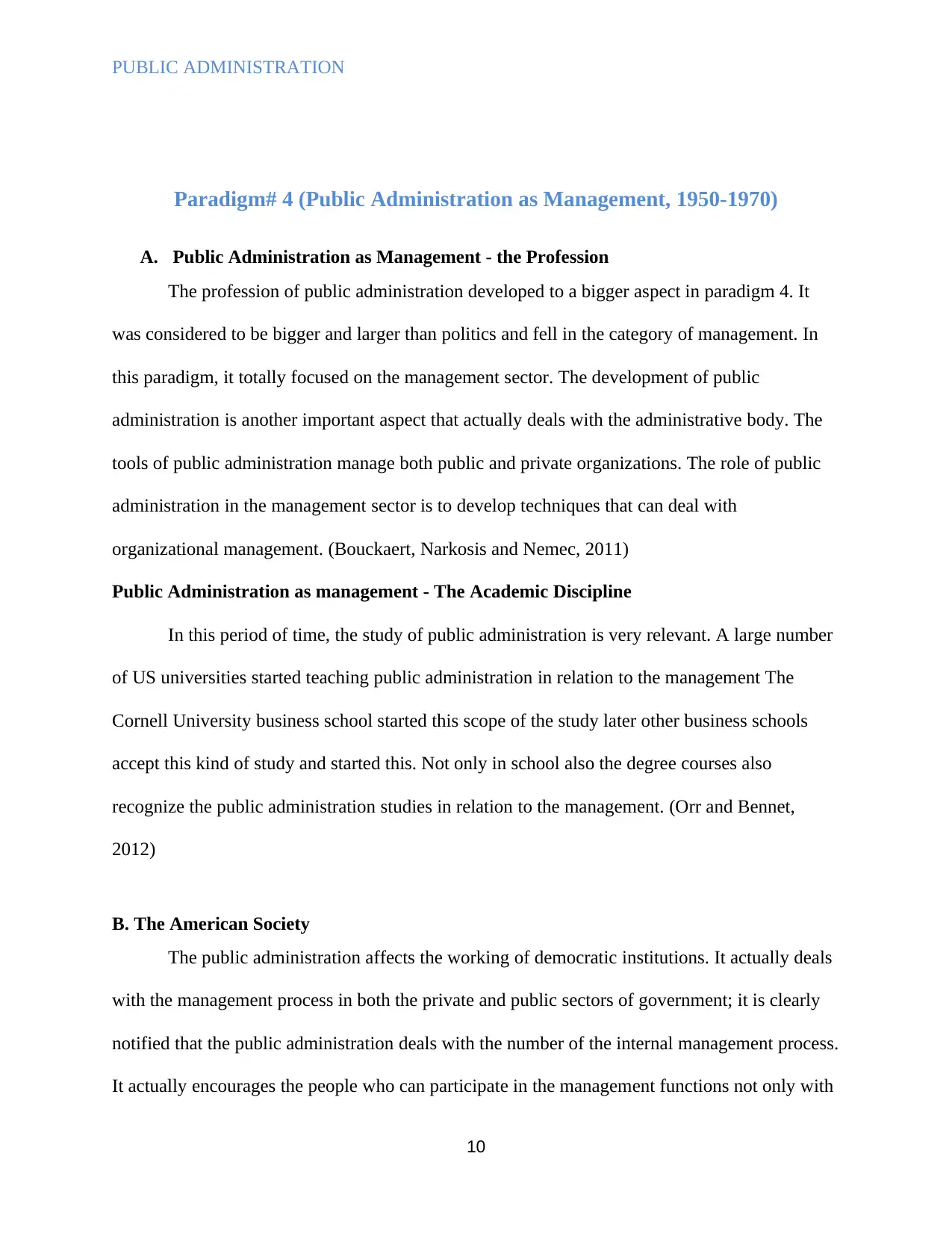
PUBLIC ADMINISTRATION
Paradigm# 4 (Public Administration as Management, 1950-1970)
A. Public Administration as Management - the Profession
The profession of public administration developed to a bigger aspect in paradigm 4. It
was considered to be bigger and larger than politics and fell in the category of management. In
this paradigm, it totally focused on the management sector. The development of public
administration is another important aspect that actually deals with the administrative body. The
tools of public administration manage both public and private organizations. The role of public
administration in the management sector is to develop techniques that can deal with
organizational management. (Bouckaert, Narkosis and Nemec, 2011)
Public Administration as management - The Academic Discipline
In this period of time, the study of public administration is very relevant. A large number
of US universities started teaching public administration in relation to the management The
Cornell University business school started this scope of the study later other business schools
accept this kind of study and started this. Not only in school also the degree courses also
recognize the public administration studies in relation to the management. (Orr and Bennet,
2012)
B. The American Society
The public administration affects the working of democratic institutions. It actually deals
with the management process in both the private and public sectors of government; it is clearly
notified that the public administration deals with the number of the internal management process.
It actually encourages the people who can participate in the management functions not only with
10
Paradigm# 4 (Public Administration as Management, 1950-1970)
A. Public Administration as Management - the Profession
The profession of public administration developed to a bigger aspect in paradigm 4. It
was considered to be bigger and larger than politics and fell in the category of management. In
this paradigm, it totally focused on the management sector. The development of public
administration is another important aspect that actually deals with the administrative body. The
tools of public administration manage both public and private organizations. The role of public
administration in the management sector is to develop techniques that can deal with
organizational management. (Bouckaert, Narkosis and Nemec, 2011)
Public Administration as management - The Academic Discipline
In this period of time, the study of public administration is very relevant. A large number
of US universities started teaching public administration in relation to the management The
Cornell University business school started this scope of the study later other business schools
accept this kind of study and started this. Not only in school also the degree courses also
recognize the public administration studies in relation to the management. (Orr and Bennet,
2012)
B. The American Society
The public administration affects the working of democratic institutions. It actually deals
with the management process in both the private and public sectors of government; it is clearly
notified that the public administration deals with the number of the internal management process.
It actually encourages the people who can participate in the management functions not only with
10
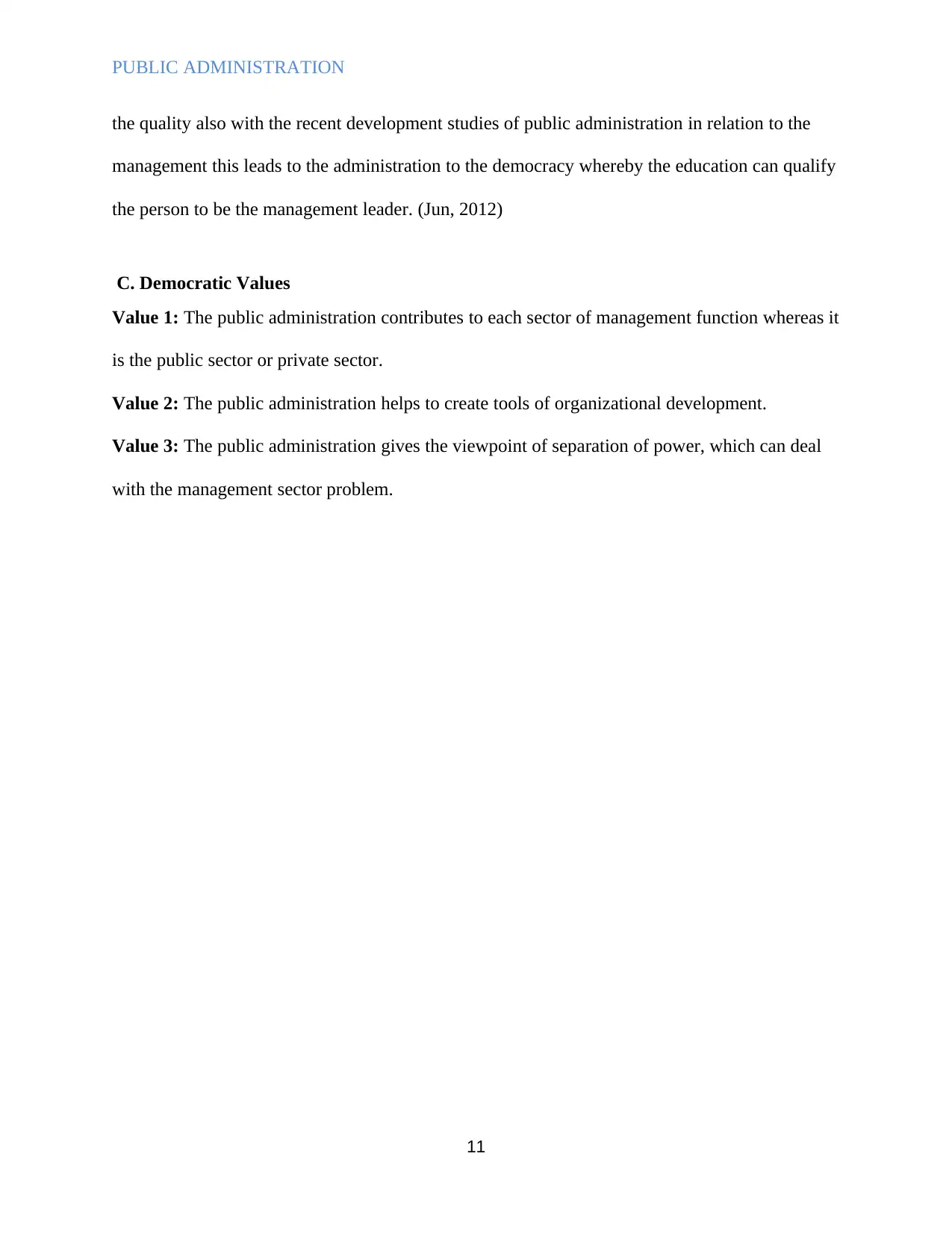
PUBLIC ADMINISTRATION
the quality also with the recent development studies of public administration in relation to the
management this leads to the administration to the democracy whereby the education can qualify
the person to be the management leader. (Jun, 2012)
C. Democratic Values
Value 1: The public administration contributes to each sector of management function whereas it
is the public sector or private sector.
Value 2: The public administration helps to create tools of organizational development.
Value 3: The public administration gives the viewpoint of separation of power, which can deal
with the management sector problem.
11
the quality also with the recent development studies of public administration in relation to the
management this leads to the administration to the democracy whereby the education can qualify
the person to be the management leader. (Jun, 2012)
C. Democratic Values
Value 1: The public administration contributes to each sector of management function whereas it
is the public sector or private sector.
Value 2: The public administration helps to create tools of organizational development.
Value 3: The public administration gives the viewpoint of separation of power, which can deal
with the management sector problem.
11
⊘ This is a preview!⊘
Do you want full access?
Subscribe today to unlock all pages.

Trusted by 1+ million students worldwide
1 out of 16
Your All-in-One AI-Powered Toolkit for Academic Success.
+13062052269
info@desklib.com
Available 24*7 on WhatsApp / Email
![[object Object]](/_next/static/media/star-bottom.7253800d.svg)
Unlock your academic potential
Copyright © 2020–2026 A2Z Services. All Rights Reserved. Developed and managed by ZUCOL.